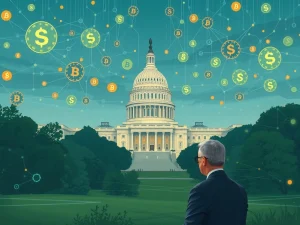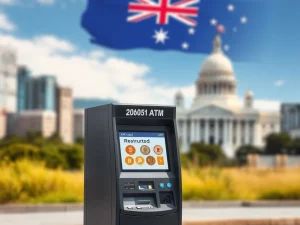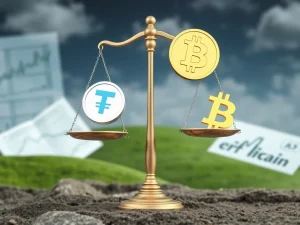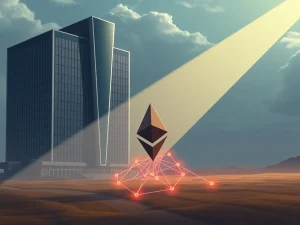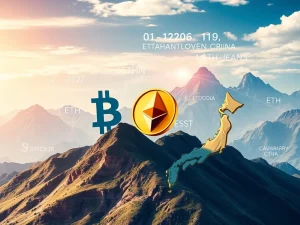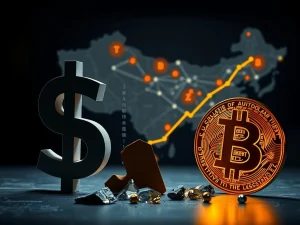Uncertainty Looms: Tokenized Commodities Emerge as Solution Amid US Gold Reserve Doubts
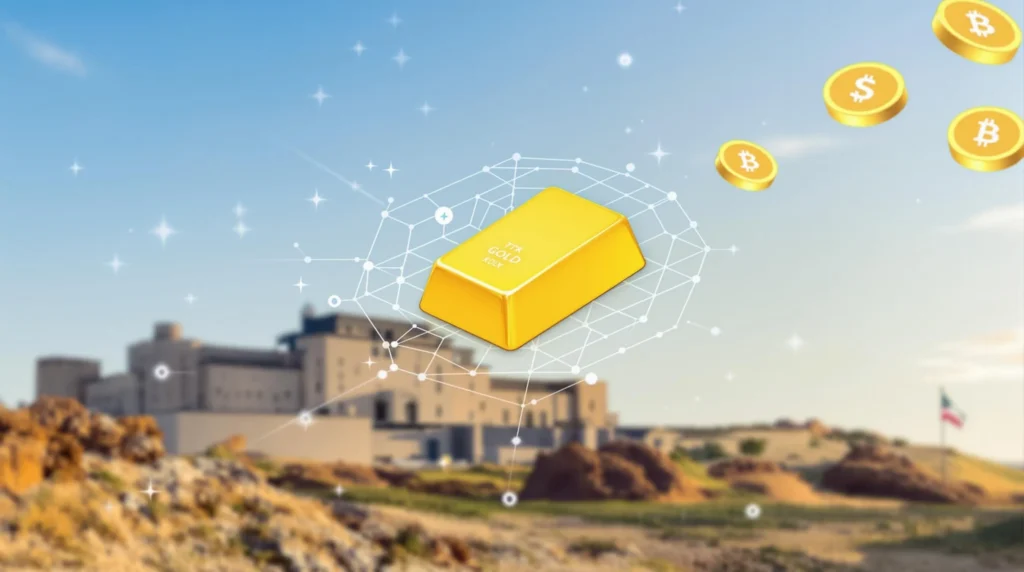
Whispers of unease are growing louder within financial circles, and at the heart of it lies a question mark hanging over America’s famed gold reserves. For over half a century, Fort Knox, Kentucky – the supposed vault for the nation’s gold – hasn’t faced a comprehensive audit. This prolonged silence has sparked creeping doubts over US gold reserves, prompting many to ask: is all that glitters truly gold? In an era demanding transparency and verifiable scarcity, these questions are not just academic; they are fundamental to trust in the global financial system. As traditional systems face scrutiny, could the innovative realm of tokenized commodities offer a compelling and much-needed alternative?
The Golden Silence: Why the Fort Knox Audit Matters
Fort Knox, a name synonymous with impenetrable security and immense wealth, is believed to hold a significant portion of the United States’ gold reserves. However, the last full audit of this crucial repository took place in the 1950s, during the Eisenhower administration. In today’s world of instant information and heightened accountability, this lengthy period without a thorough, independent verification raises eyebrows. Why should this lack of audit be a cause for concern?
- Erosion of Trust: In financial markets, trust is paramount. The absence of a recent audit can breed suspicion and erode confidence in the stated value and security of US gold holdings. This uncertainty can ripple through global markets, impacting currency values and investor sentiment.
- Transparency Deficit: Modern finance thrives on transparency. Investors, nations, and institutions rely on accurate and up-to-date information to make informed decisions. The lack of a Fort Knox audit creates a significant transparency gap, making it difficult to ascertain the true state of these vital assets.
- Historical Precedent: Throughout history, there have been instances where nations’ gold reserves were not what they were purported to be. While there’s no concrete evidence to suggest impropriety at Fort Knox, the absence of verification leaves room for speculation and fuels conspiracy theories.
The current system, reliant on faith and decades-old data, stands in stark contrast to the principles of modern, verifiable finance. This is where the concept of tokenized commodities steps into the spotlight, offering a potential paradigm shift.
Tokenized Commodities: A Modern Gold Standard?
Imagine a world where ownership of gold, silver, oil, or any commodity is represented by digital tokens on a blockchain. This is the promise of tokenized commodities. By leveraging blockchain technology, these tokens offer a transparent, secure, and easily verifiable way to own and trade real-world assets. But how exactly do they work, and why are they gaining traction as a potential solution to the doubts surrounding traditional commodity storage?
Understanding Commodity Tokenization
Commodity tokenization is the process of creating digital tokens on a blockchain that represent a specific quantity of a physical commodity. Each token is essentially a digital certificate of ownership, backed by a real-world asset held in custody. Think of it as a digital receipt for gold stored in a vault, but with enhanced transparency and security thanks to blockchain technology.
Here’s a breakdown of the key aspects:
| Feature | Traditional Commodities | Tokenized Commodities |
|---|---|---|
| Ownership Representation | Paper certificates, warehouse receipts | Digital tokens on a blockchain |
| Transparency | Limited, reliant on intermediaries | High, transactions recorded on a public ledger |
| Verifiability | Requires physical audits and trust in custodians | Blockchain-based verification, auditable on-chain |
| Accessibility | Can be complex and costly for small investors | Fractional ownership, accessible to a wider range of investors |
| Tradability | Can involve lengthy settlement processes | Faster and more efficient trading on digital exchanges |
Benefits of Embracing Tokenized Commodities
The shift towards commodity tokenization presents a multitude of advantages, particularly in addressing the concerns raised by the lack of transparency in traditional commodity storage like the Fort Knox situation. These benefits span across security, accessibility, and market efficiency.
- Enhanced Transparency and Auditability: Blockchain’s inherent transparency is a game-changer. Every transaction related to tokenized commodities is recorded on an immutable ledger, making it easy to track ownership and verify the backing assets. This eliminates the need to rely solely on trust and infrequent audits, providing continuous and verifiable proof of reserves.
- Increased Accessibility and Fractional Ownership: Traditionally, investing in commodities like gold often requires significant capital and involves complex logistics. Tokenized commodities break down these barriers by allowing fractional ownership. Investors can purchase small fractions of a token, representing a tiny portion of the underlying commodity, making it accessible to a broader range of participants.
- Improved Liquidity and Trading Efficiency: Trading physical commodities can be slow and cumbersome, involving intermediaries and lengthy settlement times. Tokenized commodities can be traded on digital exchanges 24/7, offering significantly improved liquidity and faster settlement. This efficiency reduces transaction costs and opens up new trading opportunities.
- Reduced Counterparty Risk: Traditional commodity markets involve multiple intermediaries, each introducing counterparty risk. Tokenized commodities, especially when utilizing decentralized platforms, can reduce reliance on intermediaries, minimizing counterparty risk and streamlining the trading process.
- Innovation and New Financial Products: Commodity tokenization paves the way for innovative financial products and services. These tokens can be integrated into decentralized finance (DeFi) platforms, used as collateral for loans, or incorporated into sophisticated investment strategies, expanding the utility and reach of commodities.
Navigating the Challenges of Commodity Tokenization
While the potential of tokenized commodities is immense, it’s important to acknowledge the challenges that need to be addressed for widespread adoption. These hurdles range from regulatory uncertainties to technological considerations and market education.
- Regulatory Clarity: The regulatory landscape for tokenized commodities is still evolving globally. Clear and consistent regulations are crucial to provide legal certainty, protect investors, and foster market growth. The lack of uniform regulatory frameworks can create confusion and hinder adoption.
- Custodial Solutions and Security: Ensuring the secure custody of the underlying physical commodities backing the tokens is paramount. Robust and trustworthy custodial solutions are essential to maintain investor confidence and prevent fraud. Developing secure and scalable custody infrastructure is a key challenge.
- Standardization and Interoperability: For tokenized commodities to reach their full potential, standardization and interoperability are vital. Different platforms and token standards need to be able to interact seamlessly to facilitate trading and market efficiency. Industry-wide collaboration on standards is crucial.
- Market Education and Adoption: Commodity tokenization is a relatively new concept, and widespread market education is needed to drive adoption. Investors, institutions, and regulators need to understand the benefits and risks associated with these digital assets. Building awareness and fostering trust are key to mainstream acceptance.
- Scalability and Transaction Costs: As the demand for tokenized commodities grows, blockchain networks need to be able to handle increasing transaction volumes without compromising speed or increasing costs. Scalability solutions and efficient blockchain technologies are crucial for the long-term viability of commodity tokenization.
The Future is Tokenized: A Secure and Transparent Path Forward
The questions surrounding the audit of US gold reserves at Fort Knox serve as a potent reminder of the need for greater transparency and accountability in traditional financial systems. Tokenized commodities offer a compelling vision for the future, providing a secure, transparent, and accessible way to own and trade real-world assets. While challenges remain, the benefits of commodity tokenization – from enhanced auditability to increased market efficiency – are undeniable.
As technology continues to reshape the financial landscape, digital gold and other tokenized commodities are poised to play an increasingly significant role. Embracing this innovation is not just about modernizing finance; it’s about building a more trustworthy and equitable system for all. The journey towards a fully tokenized future is underway, and it promises to be a transformative one for the world of commodities and beyond.



